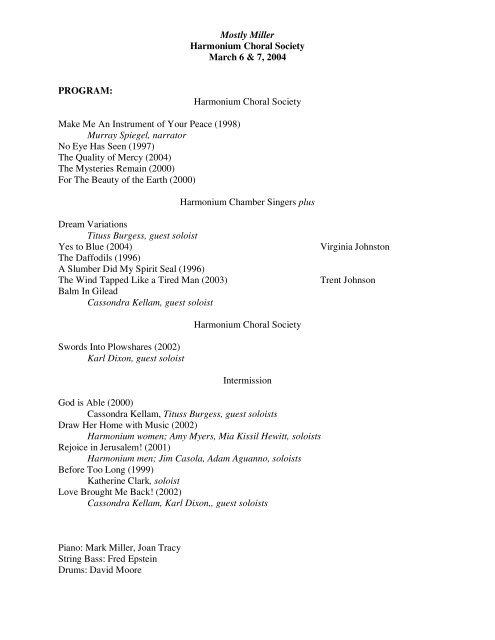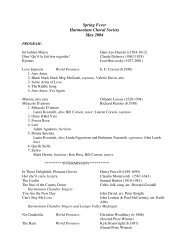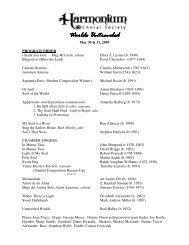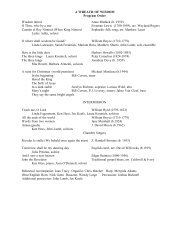Mostly Miller Harmonium Choral Society March 6 & 7, 2004 ...
Mostly Miller Harmonium Choral Society March 6 & 7, 2004 ...
Mostly Miller Harmonium Choral Society March 6 & 7, 2004 ...
You also want an ePaper? Increase the reach of your titles
YUMPU automatically turns print PDFs into web optimized ePapers that Google loves.
PROGRAM:<br />
Make Me An Instrument of Your Peace (1998)<br />
Murray Spiegel, narrator<br />
No Eye Has Seen (1997)<br />
The Quality of Mercy (<strong>2004</strong>)<br />
The Mysteries Remain (2000)<br />
For The Beauty of the Earth (2000)<br />
<strong>Mostly</strong> <strong>Miller</strong><br />
<strong>Harmonium</strong> <strong>Choral</strong> <strong>Society</strong><br />
<strong>March</strong> 6 & 7, <strong>2004</strong><br />
<strong>Harmonium</strong> <strong>Choral</strong> <strong>Society</strong><br />
<strong>Harmonium</strong> Chamber Singers plus<br />
Dream Variations<br />
Tituss Burgess, guest soloist<br />
Yes to Blue (<strong>2004</strong>) Virginia Johnston<br />
The Daffodils (1996)<br />
A Slumber Did My Spirit Seal (1996)<br />
The Wind Tapped Like a Tired Man (2003) Trent Johnson<br />
Balm In Gilead<br />
Cassondra Kellam, guest soloist<br />
Swords Into Plowshares (2002)<br />
Karl Dixon, guest soloist<br />
<strong>Harmonium</strong> <strong>Choral</strong> <strong>Society</strong><br />
Intermission<br />
God is Able (2000)<br />
Cassondra Kellam, Tituss Burgess, guest soloists<br />
Draw Her Home with Music (2002)<br />
<strong>Harmonium</strong> women; Amy Myers, Mia Kissil Hewitt, soloists<br />
Rejoice in Jerusalem! (2001)<br />
<strong>Harmonium</strong> men; Jim Casola, Adam Aguanno, soloists<br />
Before Too Long (1999)<br />
Katherine Clark, soloist<br />
Love Brought Me Back! (2002)<br />
Cassondra Kellam, Karl Dixon,, guest soloists<br />
Piano: Mark <strong>Miller</strong>, Joan Tracy<br />
String Bass: Fred Epstein<br />
Drums: David Moore
PROGRAM NOTES:<br />
It seemed appropriate when Artistic Director Anne Matlack took a brief sabbatical this winter to<br />
invite <strong>Harmonium</strong>’s Composer-in-Residence Mark Andrew <strong>Miller</strong> to fill in. As well as having<br />
composed four works for <strong>Harmonium</strong>, Mark has sung with the group, and served as Assistant<br />
Conductor when Anne was on maternity leave in 1998. He has performed in school shows with<br />
<strong>Harmonium</strong> and accompanied the chorus on the organ. Adding to this relationship of mutual<br />
respect, Mark brings a different style and perspective to music, and embraces the chance to<br />
perform his own works with this fine choir of friends.<br />
Mark is currently Director of the Gospel Choir at the Marble Collegiate Church in New York<br />
City, and is also on the faculty at Drew Theological School in Madison, New Jersey, where he is<br />
Director of Music and Instructor of Church Music. From 1999 to 2001 he was Music Associate<br />
and Assistant Organist at the Riverside Church in New York City.<br />
Mark is a very active recitalist and conference/workshop leader. Since 1997 he has performed<br />
concerts or directed conferences in twenty five states, and internationally in Austria, Estonia,<br />
Latvia, Lithuania, Russia, Puerto Rico, and Bermuda. In July of 2003 he was Music Director of<br />
Youth 2003, an international gathering of 10,000 United Methodist Youth in Knoxville,<br />
Tennessee.<br />
Composing for the church is one of Mark's passions. In <strong>March</strong> of 2003, Abingdon Press<br />
published his hymn collection, Amazing Abundance, Hymns for a Growing Church. In February<br />
of 2002 the Mark <strong>Miller</strong> Anthem Series was launched by Abingdon, and since that time over<br />
25,000 copies of his anthems have been sold. In January of <strong>2004</strong>, The Marble Community<br />
Gospel Choir performed his work, Let Justice Roll: Song from a Birmingham Jail, in which the<br />
celebrated actor, James Earl Jones was narrator. Mark's organ work, Toccata on "God Rest Ye<br />
Merry" was featured on National Public Radio's program Pipe Dreams.<br />
Mark received his Bachelor of Arts in Music from Yale University and his Master of Music in<br />
Organ Performance from Juilliard. As an undergraduate he was the recipient of the Yale Bach<br />
<strong>Society</strong> Prize and in 1989 was first prizewinner of the National Association of Negro Musicians’<br />
National Organ Competition.<br />
Make Me an Instrument of Your Peace, based on the prayer of St. Francis, was written for<br />
<strong>Harmonium</strong>'s 1998 concert about peace, PAX! Mark provided the following notes for the world<br />
premiere: "When Anne approached me about a commission for this concert on the theme of<br />
peace, I immediately thought of the prayer of St. Francis. I had always been moved by the<br />
prayer's powerful witness of love, peace, and justice. As <strong>Harmonium</strong> tenor Charles Courtney<br />
pointed out in rehearsal, the prayer is about action; 'where there is hatred, let me sow love.' The<br />
prayer is a challenge for us (not unlike some of the rhythmic motifs challenging the choir!) to be<br />
involved, to be used as an agent for change. The choir sings the mantra, 'Make me an instrument<br />
of Thy peace,' over which the entire prayer is spoken by a narrator, Murray Spiegel. In writing<br />
this work I used techniques that are familiar to me: lots of driving syncopation and tight<br />
gospel/pop/jazz harmonies." Mark dedicated Make me An Instrument to his (then) eight-month<br />
old godson, Keenan Ashby.<br />
2
Lord, make me an instrument of thy peace,<br />
where there is hatred, let me sow love;<br />
where there is injury, pardon<br />
where there is doubt, faith;<br />
where there is despair, hope;<br />
where there is darkness, light;<br />
and where there is sadness, joy.<br />
O divine master, grant that I may not<br />
so much seek to be consoled as to console,<br />
to be understood as to understand,<br />
to be loved as to love,<br />
for it is in giving that we receive,<br />
it is in pardoning that we are pardoned,<br />
and it is in dying that we are born to eternal life.<br />
No Eye has Seen was originally the second part of a three movement Easter Cantata entitled<br />
Arise. A simple melody frames the piece; the pastoral quality was intended to complement the<br />
more dramatic quality of the outer movements. The work was first scored for flute, harp, piano,<br />
string bass, and SATB choir. The text comes from the Christian scriptures which offer words of<br />
encouragement and hope to the early church in Corinth. No Eye Has Seen received its premiere<br />
at the Chatham United Methodist Church in Chatham, New Jersey on Easter Sunday, 1997. In<br />
2001 Mark dedicated the piece to celebrate the wedding of Pinney and Paula Colton, two<br />
students who, while attending Drew University, first met when they sang together in the church<br />
choir at Chatham Methodist. It was published in 2002 by Abingdon Press in Nashville.<br />
No eye has seen,<br />
no ear has heard,<br />
nor human heart conceived<br />
what God has prepared<br />
for those who love the Lord.<br />
The Quality of Mercy is the fourth composition written by Mark and commissioned by<br />
<strong>Harmonium</strong>. The composer was inspired when he heard a guest on National Public Radio's<br />
Fresh Air quote the text from Shakespeare's Merchant of Venice. This work is in some ways a<br />
departure from Mark's more traditional harmonic style, employing meterless phrases, tone<br />
clusters, and bi-tonality. He writes, "I wanted to experiment with the boundary between speech<br />
and melody while also taking advantage of the choir's considerable skill at performing<br />
challenging music." The Quality of Mercy was written in January <strong>2004</strong> and receives its<br />
premiere at this weekend's performances.<br />
The quality of mercy is not strain’d,<br />
It droppeth as the gentle rain from heaven<br />
Upon the place beneath: it is twice blest;<br />
It blesseth the one that gives and the one that takes.<br />
3
The Mysteries Remain combines images of Greek and Christian symbols with references to both<br />
Demeter and Iacchus, along with phrases of the one who is 'red wine and bread', who 'names the<br />
living, dead' and is 'the vine'. The poem by H. D. has a built-in rhythm that naturally lends itself<br />
to an ostinato pattern in the musical setting. The work was commissioned jointly by <strong>Harmonium</strong><br />
and the Geraldine R. Dodge Foundation Poetry Festival. At the premiere in September 2000,<br />
Mark explained, "It is the rhythm of the poem that gave me the idea for the music; child-like yet<br />
compelling, a simple folk-like tune that still engages the listener with some harmonic surprises."<br />
The mysteries remain,<br />
I keep the same<br />
cycle of seed-time<br />
and of sun and rain;<br />
Demeter in the grass,<br />
I multiply,<br />
renew and bless<br />
Iacchus in the vine;<br />
I hold the law,<br />
I keep the mysteries true,<br />
the first of these<br />
to name the living, dead;<br />
I am red wine and bread.<br />
I keep the law,<br />
I hold the mysteries true,<br />
I am the vine,<br />
the branches, you<br />
and you.<br />
For the Beauty of the Earth was written in 2000 for Keith Morton, a Drew seminary student, in<br />
honor of his grandmother. It was first sung that spring at the Riverside Church in New York City<br />
by the Riverside Choir during a Sunday service. Although the piece was originally written only<br />
for piano and SATB choir, the composer always 'heard' a rhythm section as integral to the work.<br />
The hymn, For the Beauty of the Earth, with music written by Conrad Kocher in 1838 (and<br />
fleetingly quoted in Mark's composition), continues to be very popular in the church Mark was<br />
raised in.<br />
For the beauty of the earth,<br />
for the glory of the skies,<br />
for the love which from our birth<br />
over and around us lies.<br />
For the beauty of the earth,<br />
this our grateful hymn of praise,<br />
God of all to thee we raise<br />
our hymn of praise.<br />
4
For the beauty of each hour,<br />
of the day and of the night,<br />
hill and vale and tree and flower,<br />
sun and moon and stars of light.<br />
Lord of all to thee we raise,<br />
this our grateful hymn of praise.<br />
For the joy of human love,<br />
brother, sister, parent, child,<br />
friends on earth and friends above,<br />
for all gentle thoughts and mild.<br />
For each perfect gift of thine,<br />
to the world so freely given,<br />
faith and hope, and love divine,<br />
peace on earth and joy in heaven.<br />
The next group of works are for smaller musical forces. Leading off and closing this set will be<br />
two solos, while the <strong>Harmonium</strong> Chamber Singers will sing Mark’s settings of poems by<br />
William Wordsworth plus pieces by two other talented New Jersey composers, Virginia Johnston<br />
and Trent Johnson.<br />
Mark’s setting of the Langston Hughes poem Dream Variations, features guest soloist Tituss<br />
Burgess from the Marble Community Gospel Choir in New York City.<br />
To fling my arms wide<br />
In some place of the sun,<br />
To whirl and to dance<br />
Till the white day is done.<br />
Then rest at cool evening<br />
Beneath a tall tree<br />
While night comes on gently,<br />
Dark like me--<br />
That is my dream!<br />
To fling my arms wide<br />
In the face of the sun,<br />
Dance! Whirl! Whirl!<br />
Till the quick day is done.<br />
Rest at pale evening . . .<br />
A tall, slim tree . . .<br />
Night coming tenderly<br />
Black like me.<br />
5
Yes to Blue is one of the two pieces on the program not written by Mark, but by another young<br />
New Jersey composer, Virginia Johnston. Ginny is currently Managing Director of the<br />
Philharmonic Orchestra of New Jersey, and Minister of Music at the Springfield Emanuel United<br />
Methodist Church along with her husband, pianist Dan Crisci. She has led the Triad Ensemble, a<br />
20-voice mixed choir, for eight seasons and co-chaired the annual Canticles for Life AIDS<br />
Benefit concerts for seven years. As a singer song-writer, Ginny performs solo and with her<br />
folk/rock band Mosaic. Her works have been performed by the NJ Percussion Ensemble, the<br />
New Music Consort, the <strong>Society</strong> for New Music, and the New Jersey Youth Symphony.<br />
Poet Jim Haba is the Poetry Director of the Geraldine R. Dodge Foundation, designing and<br />
producing all nine biennial Dodge Poetry Festivals. Ginny writes the following about setting Yes<br />
to Blue to music: I was given a copy of Bill Moyer’s Fooling with Words: A Celebration of<br />
Poets and Their Craft. In the opening Acknowledgments section, there was Jim Haba’s Yes to<br />
Blue, which immediately resonated with me. I have always maintained that the wonderful<br />
mystery of creativity can be revealed - ever so slightly - through color. I hope this setting - a<br />
marriage of color, words and music - will give a glimpse of the timeless, renewing power of art.”<br />
Yes to blue after trying<br />
to separate green from yellow<br />
and hoping that everything<br />
will get simpler each time<br />
you bring an idea closer<br />
to the light which is always<br />
changing, always being<br />
born<br />
day after day<br />
year after year<br />
again and again<br />
now.<br />
The next work, which he composed in 1996, is Mark’s setting of Wordsworth’s classic poem<br />
The Daffodils.<br />
I wandered lonely as a cloud<br />
That floats on high o'er vales and hills,<br />
When all at once I saw a crowd,<br />
A host, of golden daffodils,<br />
Beside the lake, beneath the trees,<br />
Fluttering and dancing in the breeze.<br />
Continuous as the stars that shine<br />
And twinkle on the milky way,<br />
They stretched in never-ending line<br />
Along the margin of a bay:<br />
Ten thousand saw I at a glance<br />
Tossing their heads in sprightly dance.<br />
6
The waves beside them danced, but they<br />
Out-did the sparkling waves in glee:<br />
A Poet could not be but gay<br />
In such a jocund company!<br />
I gazed - and gazed - but little thought<br />
What wealth the show to me had brought:<br />
For oft, when on my couch I lie<br />
In vacant or in pensive mood,<br />
They flash upon that inward eye<br />
Which is the bliss of solitude;<br />
And then my heart with pleasure fills,<br />
And dances with the daffodils.<br />
Mark dedicated A Slumber Did My Spirit Seal, another Wordsworth poem he set to music in<br />
1996, “to all those who have a hard time getting up in the morning.”<br />
A slumber did my spirit seal;<br />
I had no human fears:<br />
She seemed a thing that could not feel<br />
The touch of earthly years.<br />
No motion has she now, no force;<br />
She neither hears nor sees;<br />
Rolled round in earth's diurnal course,<br />
With rocks, and stones, and trees.<br />
The Wind Tapped Like a Tired Man is the other work on the program not composed by Mark.<br />
This setting of the Emily Dickinson poem was written last year by another young New Jerseyan,<br />
Trent Johnson, organ recitalist, conductor and composer. Trent has written works for piano,<br />
organ, chorus, orchestra and chamber ensembles. Recent compositions include Concerto for<br />
Trumpet, The Pascal Lamb, Visions for organ, and Outback for didgeridoo and piano. He is a<br />
2001 recipient of the Meet the Composer Grant sponsored by the New York String <strong>Society</strong>. A<br />
graduate of Peabody Institute at Johns Hopkins University and the Juilliard School, Trent is the<br />
current director of music and arts at the First United Methodist Church in Westfield, and<br />
conductor of the Oratorio Singers and Orchestra of Westfield. (Biographical notes taken from<br />
The Montclair Times dated <strong>March</strong> 26, 2003 and a Kean University press release dated <strong>March</strong> 20,<br />
2003.)<br />
The Wind -- tapped like a tired Man --<br />
And like a Host -- "Come in"<br />
I boldly answered -- entered then<br />
My Residence within<br />
7
A Rapid -- footless Guest --<br />
To offer whom a Chair<br />
Were as impossible as hand<br />
A Sofa to the Air --<br />
No Bone had He to bind Him --<br />
His Speech was like the Push<br />
Of numerous Humming Birds at once<br />
From a superior Bush --<br />
His Countenance -- a Billow --<br />
His Fingers, as He passed<br />
Let go a music -- as of tunes<br />
Blown tremulous in Glass --<br />
He visited -- still flitting --<br />
Then like a timid Man<br />
Again, He tapped -- 'twas flurriedly --<br />
And I became alone --<br />
The last number in this set is Mark’s setting of the American Negro spiritual There Is a Balm in<br />
Gilead, featuring guest soloist Cassondra Kellam, also from the Marble Community Gospel<br />
Choir.<br />
REFRAIN<br />
There is a balm in Gilead<br />
To make the wounded whole;<br />
There is a balm in Gilead<br />
To heal the sin-sick soul.<br />
Sometimes I get discouraged,<br />
And think my work's in vain;<br />
But then the Holy Spirit<br />
Revives my soul again.<br />
If you cannot preach like Peter,<br />
If you cannot pray like Paul,<br />
Just tell the love of Jesus,<br />
And say He died for all.<br />
Since arriving at the Marble Collegiate Church in September 2002, Mark has had many great<br />
opportunities to write for the Marble Community Gospel Choir. In November of that year<br />
Marble Church hosted their annual "Trialogue Sunday," in which Rabbi Ronald Sobel and Imam<br />
Al-Hajj Talib 'Abdur-Rashid from New York City converse with the church's pastor, Rev. Dr.<br />
Arthur Caliandro, during the sermon. Swords Into Plowshares, a piece whose text comes from<br />
prophet Isaiah in the Hebrew scriptures, was written especially for this service. The composer<br />
8
hopes that this gospel work embodies some of the hopes and dreams of those three great<br />
religions. The piece features guest soloist Karl Dixon, also from the Marble Community Gospel<br />
Choir.<br />
They shall turn their swords into plowshares<br />
And their spears into pruning hooks,<br />
They shall turn their swords into plowshares<br />
Neither shall they learn war anymore.<br />
Make me an instrument of peace.<br />
Make me, Lord, make me, Lord,<br />
An instrument of peace.<br />
Diana Solomon-Glover, soprano soloist of the Riverside Church Choir, first approached Mark in<br />
the spring of 2000 to ask him to write a piece for her. In July of that year, Solomon-Glover<br />
premiered God Is Able at the Riverside Church in its original 'soprano solo' form. Mark was<br />
moved to write the piece after reading a prayer in the United Methodist Hymnal that had been<br />
adapted by Martin Luther King, Jr. God Is Able was published in 2002 as part of the Mark<br />
<strong>Miller</strong> Anthem Series at Abingdon Press in Nashville. Cassondra Kellam and Tituss Burgess<br />
are the guest soloists.<br />
When you’ve fallen in despair,<br />
there’s a sadness you can’t bear,<br />
just remember there’s a God who cares.<br />
Don’t be afraid, God is able.<br />
Do addictions bind you tight,<br />
Do you lack the strength to fight?<br />
God will surely set you free.<br />
Why be afraid? God is able.<br />
Hallelujah! Say amen!<br />
O hallelujah! Shout again.<br />
Hallelujah! O praise the Lord,<br />
God is able, surely God is able.<br />
Are you mourning a loved one’s loss,<br />
grief and pain your constant cross?<br />
All your burdens God can bear.<br />
Don’t despair, God is able.<br />
Is life’s twilight coming near?<br />
Is it death that you fear?<br />
God gives power to endure.<br />
God is able, surely God is able.<br />
9
Draw Her Home with Music, for sopranos and altos, uses another text by Shakespeare, from the<br />
Merchant of Venice. It was commissioned by Summit, New Jersey's Concord Singers (Michael<br />
Sanflippo, Director) and premiered in December 2002. This text was also the inspiration for<br />
Rogers and Hammerstein's The Sound of Music. The soloists are Amy Myers and Mia Kissil<br />
Hewitt.<br />
How sweet the moonlight sleeps upon this bank!<br />
Here we will sit, and let the sounds of music<br />
Creep in our ears: soft stillness and the night<br />
Becomes the touches of sweet harmony.<br />
Come, ho, and wake Diana with a hymn!<br />
With sweetest touches pierce your mistress’ ear.<br />
And draw her home with music.<br />
Rejoice in Jerusalem! for tenors and basses, was commissioned by the Gay Gotham Chorus of<br />
New York City (Jonathon Babcock, Conductor) and premiered in a December 2001 concert at<br />
the Church of St. Paul and St. Andrew in Manhattan. Written to address September 11, it uses<br />
the biblical text from the Psalms and the prophet Isaiah to convey a message of consolation and<br />
hope for the future of the city. The soloists are Jim Casola and Adam Aguanno.<br />
I will rejoice in Jerusalem, and be glad in my people.<br />
No more will we hear in it the sound of weeping or the cry of distress.<br />
I will lift up my eyes to the hills; from where will my help come?<br />
Help comes from the Lord, who made the heavens and the earth.<br />
The Lord will keep your coming and going, now and forever more.<br />
<strong>Harmonium</strong> commissioned Before Too Long for their December 1999 concert, The Advent of a<br />
New Age. The poem, by 14-year-old Alena Synková, is found in I Never Saw Another Butterfly.<br />
It was preserved in manuscript in pencil on a scrap of yellowed paper. Alena Synková was born<br />
in Prague on September 24, 1926, and deported to Terezin on Dec. 22, 1942. She returned home<br />
after the liberation. The text is sad yet amazingly hopeful. Many of <strong>Harmonium</strong>'s members had<br />
the incredible experience of actually singing this piece at Terezin when touring Eastern Europe<br />
in 2002. The solist is Katherine Clark.<br />
I'd like to go away alone<br />
Where there are other, nicer people,<br />
Somewhere into the far unknown,<br />
There, where no one kills another.<br />
Maybe more of us,<br />
A thousand strong,<br />
Will reach this goal<br />
Before too long.<br />
10
Love Brought Me Back! was written for Easter 2002 and first performed by the Marble<br />
Community Gospel Choir at Marble Collegiate Church. It was inspired by a sermon delivered<br />
by the senior pastor of the Riverside Church, Jim Forbes. This powerful gospel song celebrates<br />
that the power of love will ultimately triumph over fear and hate. Karl Dixon and Cassondra<br />
Kellam are the guest solists.<br />
Fear and hatred had done their very worst,<br />
despair had had its day.<br />
Sorrow and sadness were hangin’ in the air,<br />
the gloom would not go away.<br />
But early Sunday morning<br />
the women saw the Lord<br />
and there they heard him say,<br />
“I’m back!”<br />
“Hallelujah, I’m back!<br />
Don’t you know that<br />
death could not hold me,<br />
love is what owns me.”<br />
“Just here to tell ya,<br />
God’s got one last word,<br />
and that’s love, love, love,<br />
love brought me back!”<br />
11
















